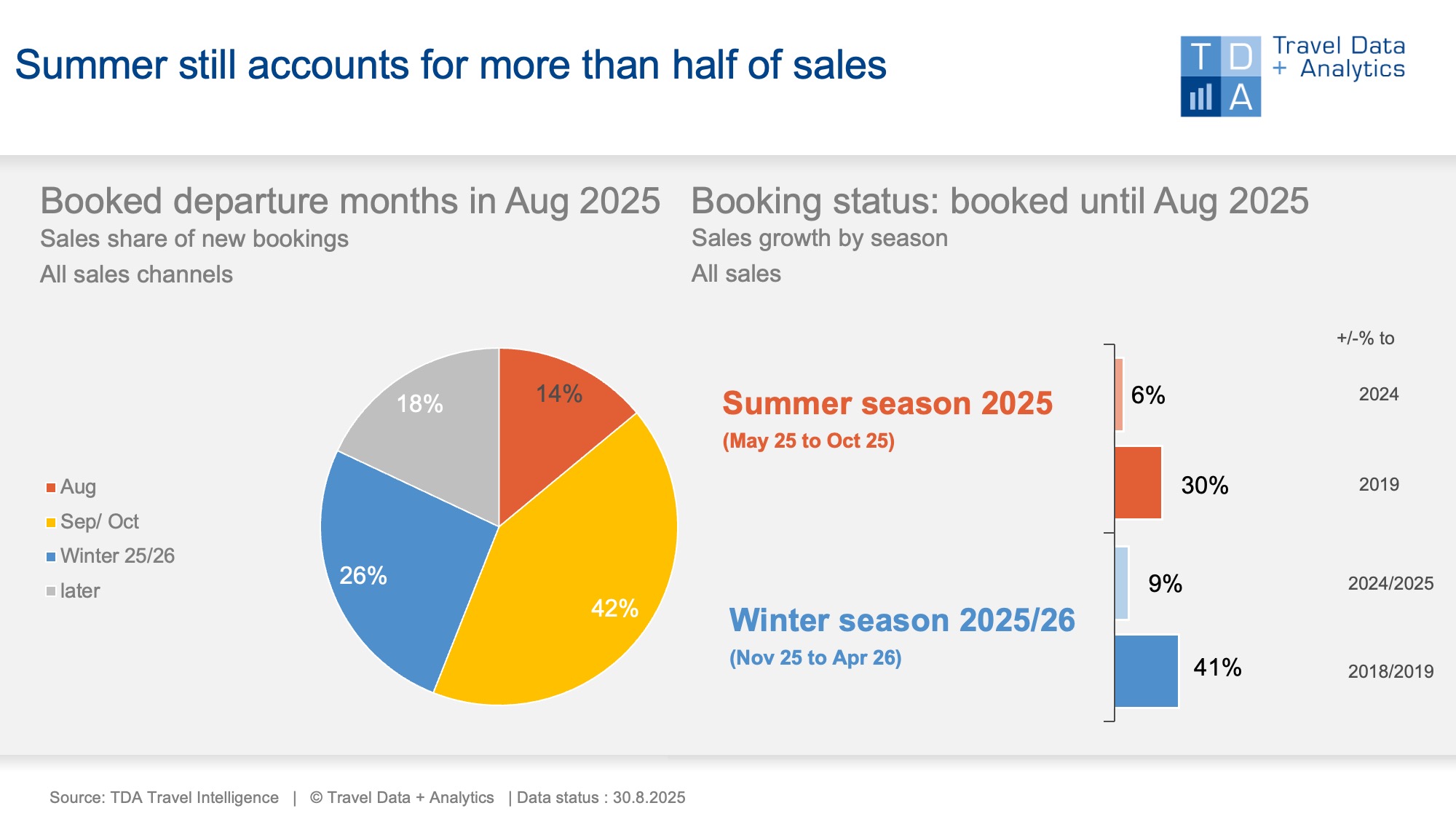Nuremberg, September 30, 2025 – With two months of departures remaining before the end of the 2025 summer season, total revenues have already reached the level of the previous year's season. This means that this year's summer season is also set to end with growth. Based on the current booking status at the end of August 2025, the summer revenue increase remains at a cumulative 6 per cent thanks to good booking figures. The 2025/26 winter season, which begins in November, currently shows revenue growth of 9 per cent compared to the previous year. As expected, the positive early booking increase continues to decline – by another two percentage points compared to the previous month.
In August, German citizens mainly booked their upcoming autumn holidays. In terms of sales, the travel months of September and October account for 42 per cent of the monthly sales generated by travel agencies and traditional online portals. A further 14 per cent is accounted for by last-minute holiday bookings with departures still in August. This means that more than half of sales still go to the current summer season – and with an 8 per cent increase in sales compared to the same month last year in terms of bookings received, the 2025 summer season can continue to maintain its cumulative level (+6 per cent). Provided that monthly booking revenues remain at roughly the same level as last year in the remaining two booking months until the end of the season, growth of 5 or 6 per cent is possible in the final result. However, the number of holidaymakers booked to date only slightly exceeds last year's level (+1 per cent). This year's foreseeable growth is therefore based primarily on increased travel expenditure and less on a year-on-year increase in demand for organised holiday trips. Compared to the level in summer 2019, one in ten holidaymakers is still missing.
Around a quarter of monthly turnover in August is attributable to winter holiday bookings. This share has risen significantly compared to the previous month (+6 percentage points) and will now continue to grow from month to month. Winter turnover in August exceeded the same month last year by 4 per cent, meaning that the cumulative increase in turnover for the upcoming winter season continues to melt away: With a current increase of 9 per cent, the new 2025/26 winter season has reached a booking level of 41 per cent at the end of August 2025, measured against last year's seasonal turnover. Thanks to a good number of early bookings, the number of winter holidaymakers booked has grown by 6 per cent. Early bookers are also proving to be a growing factor in the market for next year's summer season: with an 18 per cent share of sales, almost one in five holiday euros spent on package tours in August is accounted for by summer holidays in 2026. Compared to the previous year, this represents an increase of 2 percentage points.

Legend:
The chart shows the cumulative holiday bookings generated by the end of August 2025 for the next winter season 2025/2026 and the current summer season 2025 compared to the previous year. TDA's analysis includes holiday travel bookings in travel agencies as well as online on the travel portals of tour operators and online travel agencies (OTAs) with a focus on package holidays. The chart on the left shows the percentage of sales in the booking month of June accounted for by the individual travel months and seasons.
About TDA Travel Intelligence
Travel Data + Analytics (TDA) took over in spring 2019 the travel sales panel run by the Nuremberg market research company GfK since 2004. After the GfK data had been migrated to a new IT landscape, Travel Intelligence was set up as an independent solution with a self-learning database and associated analysis tool. The basis remains the booking data from stationary travel agencies and online portals that sell tour operator products. The requirements of tourism companies on a modern control instrument and evolving, increasingly dynamic questions can thus be mapped reliably and promptly, without giving up the core of a market-representative method that is consistently comparable over time. TDA = Current booking situation + individual product performance + new market opportunities.
Further information: Alexandra Weigand, alexandra.weigand@traveldataanalytics.de, phone: +49 (0)911 951 510 03